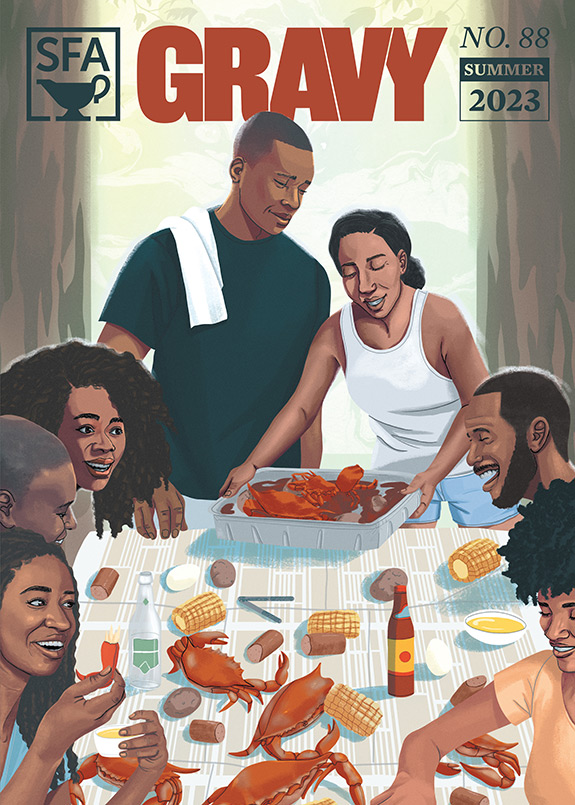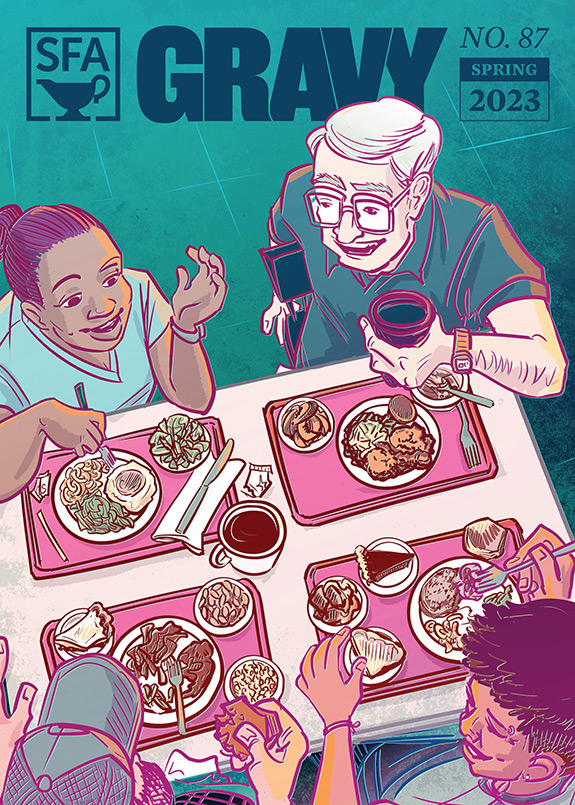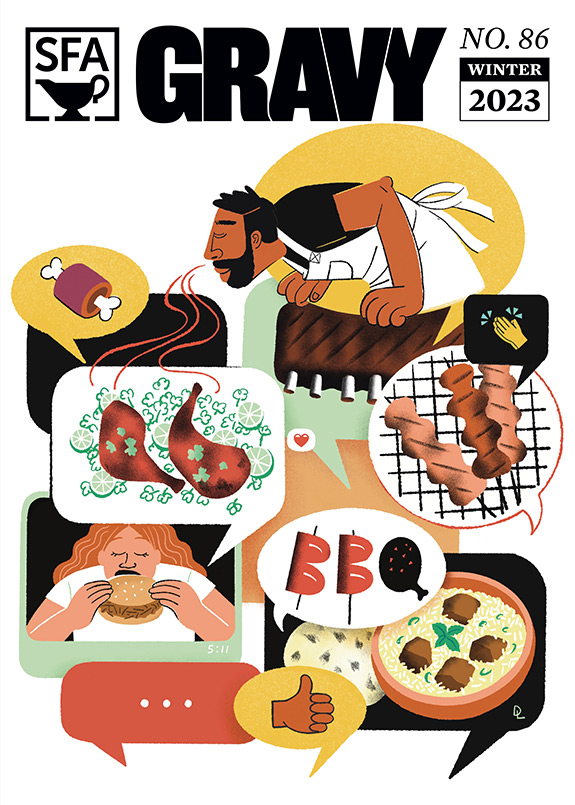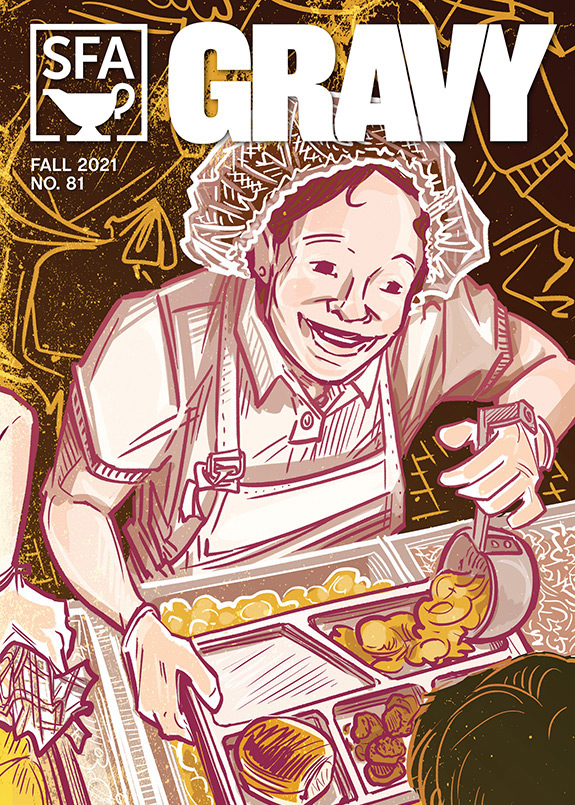Statement from CSSC Committee
September 1, 2020
On July 6, the director of the Center for the Study of Southern Culture (CSSC) and the Dean of the College of Liberal Arts at the University of Mississippi (UM) released a statement in response to specific and concerning critiques of the Southern Foodways Alliance (SFA) and its director, John T. Edge. In that statement, the CSSC director and the Dean pledged to thoughtfully and deliberately consider the critiques and to assemble an internal review committee composed of faculty and staff of the CSSC, a representative from the UM College of Liberal Arts, and representatives of the SFA staff and board. Over the course of July, the CSSC director heard from many stakeholders in the SFA. Perspectives ranged from avid supporter to vocal opponent, with most people expressing a deep commitment to the SFA and to its future. On August 3, the CSSC director finalized the composition of the review committee. Our names appear at the bottom of this letter.
We write now to outline and clarify the outcome of our work over the past several weeks and to begin charting a path forward. We want to say clearly that this statement—and many of the recommendations therein—marks the beginning of a longer process of review, evaluation, and organizational restructuring for the SFA. A recurring pattern in the feedback we’ve received is that structural change is needed, and needed urgently. We agree.
Based on what we have heard over the past two months, critiques and concerns raised by members and observers of SFA in years past, and our own discussions, we identify three areas that call for both immediate action and sustained attention: (1) a clarification of the relationship between the CSSC and the SFA; (2) problems of institutional racism and patriarchy that suffuse the University of Mississippi and affect the organizational structures and operations of the SFA, as well as of the CSSC itself and its institutes; and (3) the urgent need for the SFA not just to assemble a more diverse leadership team and paid staff, but also to make an explicit and concrete commitment to equity in its mission, organizational structure, and general operations. Below, we detail each of these areas of attention and, where possible, outline what happens next.
Relationship Between the CSSC and the SFA
Although it has always enjoyed considerable autonomy, the SFA began in 1999 as an institute of the CSSC. The SFA’s current mission is to document, study, and explore the diverse food cultures of the changing American South, and this mission resonates with the CSSC’s work to critically study and engage that region. Colleagues in both organizations value each other and the work they have done. Perhaps more importantly, there is overwhelming agreement both among colleagues in the CSSC and the leadership and membership of the SFA that the work of both organizations is not just complementary but synergistic. Because of that, we are hopeful that the potential for shared work will continue.
What happens next: The CSSC and SFA will chart a future together at this time. The longtime viability of the partnership will depend, in no small part, on the outcomes and implementation of the below recommendations. Should the organizational goals of the CSSC and the SFA diverge in ways that make common work impractical, or otherwise not desired, the organizations will revisit this relationship.
Institutional Racism and Patriarchy
The choice to study, document, and explore food—particularly the foodways and food systems of the U.S. South—is an inherently political act that involves not only the well-being of communities today but tracks straight back to enslaved labor within the region, particularly the labor of black women in kitchens and fields. That relationship—between southern foodways, violence, exploitation, and erasure—holds true for communities of color throughout the nation, compounds contemporary patterns of structural inequality, and reinforces the long-standing power and tolls of white supremacy and patriarchy in American society. In order to fulfill its mission, the SFA must acknowledge and address this reality, not just in its scholarly and storytelling pursuits, but also in its organizational structure, general operations, and programming decisions. In our view, this should begin with an audit of the ways that institutional racism and patriarchy have shaped, whether intentionally or not, the SFA’s and the CSSC’s structures and programming.
What happens next: The CSSC and the SFA will engage both the UM Division of Diversity and Community Engagement (DDCE) and an external agency to map strategies for increasing the diversity of SFA leadership and staff and the practice of equity in the organization’s decision-making and general operations. Although the SFA has worked diligently to be sure that diverse voices speak during its programming and in its oral histories and publications, decision making itself has remained concentrated within a more narrow register of white voices. We have compiled a list of external agencies specifically well suited to assist a university-based non-profit in such a self-study, and we are currently reviewing these possibilities.
The coming reassessment is not symbolic. It is not review for the sake of review, or dialogue for the sake of discussion. It is a deliberate effort to identify and implement a set of concrete, actionable recommendations that will address what we see as valid concerns about diversity, equity, and inclusion in the composition of SFA’s paid staff; the leadership of SFA’s general operations and year-to-year programming; and the structure of SFA’s leadership, which we believe needs to shift from an organic to a strategic model of growth. Such expansion is appropriate for a mature organization such as the SFA that plans for a robust future. To the extent that the CSSC and SFA hope to chart a future together, we see the coming reassessment as a moment for the CSSC, too, to evaluate and institutionalize its own commitment to diversity and equity. The director and colleagues of the CSSC agree and will also participate in this self-assessment and implement the action plans resulting from it. In practical terms, we expect to unfold these organizational changes over the next two years, and we expect them to result in new leadership for the SFA, a change for which the current director has been planning for some time.
Immediate Actions to Address Diversity, Equity, and Inclusion
We want to say explicitly that gradualism is not an acceptable response to problems of institutional racism and patriarchy; and diversity and inclusion are neither the same as nor acceptable proxies for equity. We are hopeful that the assessment process will begin soon, and that the subsequent recommendations will be implemented with urgency. In the meantime, there are a number of changes that, while piecemeal, we see as absolutely necessary and able to be implemented. Some of these items have been outlined and endorsed by SFA leadership previously. Some developed over the course of our recent discussion. All are meant to begin the work of making the SFA a better, more diverse, and more inclusive organization, and to position the organization for the equity work that its mission requires.
What happens next: We recommend that the SFA make a cluster of hires over the next several years that will diversify the staff and redistribute decision-making power. As mentioned, this process will be guided by the observations and recommendations of the UM DDCE and external review agency. We would be remiss if we did not say outright that the plan to make these hires will be affected by the pandemic- generated economic crisis facing UM. For instance, UM has instituted a hiring freeze, and there is currently no definitive budget for the 2020-21 academic fiscal year. While these factors are challenging in the short term, the urgent and absolutely critical need for such hires is understood by the director of the CSSC, colleagues across the CSSC, the current leadership of SFA, much of the SFA membership, and leadership in UM’s College of Liberal Arts.
Beyond the plan for cluster hires that prioritize candidates from minoritized racial/ethnic groups, the SFA has committed to implement the following items immediately: the SFA will hire a guest curator to develop programming for at least one SFA event each year, and a guest editor to curate content for at least one issue of Gravy each year. The SFA will make the avenues for submitting pitches for Gravy the podcast, Gravy the journal, SFA films, and SFA events more visible and easier to access. The SFA will make brainstorming sessions for symposia speakers open to all SFA members via digital platforms.
Recent and long-standing critiques of the SFA have brought the organization to an important moment, and it is not lost on us that it took time and harm to reach it. We, the undersigned, take this opportunity for assessment and restructuring in the organization—as well as in the CSSC—seriously, and we see it as urgent and critically important. We will end how we began, by reemphasizing that this statement and the foregoing recommendations are only the beginning of an extended and intentioned process. The CSSC and the SFA look forward to sharing additional next steps in the coming months.
Simone Delerme, McMullan Associate Professor of Southern Studies and Associate Professor of Anthropology
Kirsten Dellinger, Professor of Sociology; Associate Dean for Diversity and Inclusion, UM College of Liberal Arts
Ralph Eubanks, Visiting Professor of Southern Studies and English; SFA Board Member
Brian Foster, Assistant Professor of Southern Studies and Sociology
Melissa Booth Hall, Managing Director, Southern Foodways Alliance
Andy Harper, Director, Southern Documentary Project; Instructional Assistant Professor of Southern Studies
Mary Beth Lasseter, Associate Director, Southern Foodways Alliance
Kathryn McKee, McMullan Professor of Southern Studies and Professor of English; Director, Center for the Study of Southern Culture
Catarina Passidomo, Southern Foodways Alliance Associate Professor of Southern Studies and Associate Professor of Anthropology
Jodi Skipper, Associate Professor of Southern Studies and Anthropology
Afton Thomas, Associate Director for Programs, Center for the Study of Southern Culture
Jennifer Wallach, Professor of History and Chair, University of North Texas, SFA Board Member
Statement from Dr. Kathryn McKee, Director of The Center for the Study of Southern Culture and Dr. Lee Cohen, Dean of the College of Liberal Arts at the University of Mississippi
July 6, 2020
The past few days have brought rising criticism of the Southern Foodways Alliance (SFA) that questions past action, its current state, and its future direction. We take those concerns very seriously. In the coming days, we will be assembling a planning committee that will include faculty and staff of the Center for the Study of Southern Culture (CSSC); a representative from the University of Mississippi (UM) College of Liberal Arts; and representatives of the SFA staff and board. We will also consult with purposefully diverse voices from broader constituencies, including the world of non-profit institutes, food studies, and other academic organizations with similar missions.
By mutual consent with the SFA, the CSSC will play a leadership role in this process, working to clarify the precise nature of the relationship between them. As the academic home of undergraduate and graduate programs in Southern Studies and in Documentary Expression, the Center is committed to principles of equity and inclusiveness, and it does not take lightly the implication that these have been inconsistently applied.
On or before September 1, we will share the first steps of a plan for the future of the SFA. We will work within the framework of UM employment guidelines, as well as within guidelines from the College of Liberal Arts regarding individual unit reviews. Parts of that plan will necessarily require time for us to develop and implement so that we do not jeopardize the future of the organization as a whole. Clearly the SFA inspires deep feeling and what comes next for it matters to a great many people, including the two of us.
Kathryn B. McKee
Director, The Center for the Study of Southern Culture
Lee Cohen
Dean, College of Liberal Arts
Statement from John T. Edge
Since 1999, I have worked with sincere intent to tell new stories from this old place. Narratives that change the South for the better. SFA founders, board, staff, and collaborators have aimed, since inception, to address inequities, including the historic and contemporary impact of racism. Over the last decade, we have expanded our focus to address inequities grounded in gender, class, ethnicity, and other differences. Because we began and continue our work in that spirit, SFA members and audiences expect more from us. And they expect more from me. This week I learned, in conversations with members and collaborators, and through a New York Times article, that the people of SFA demand more of me still. I welcome and accept that challenge. I promise to listen, absorb, reflect, and act. And so do my colleagues, with whom I work in a consensus-based office, and whose dedication to drive progress in the South inspires me. Part of carrying our plan of work forward will mean a future change in SFA leadership. I welcome the positive impact that change can have on SFA.
—John T Edge
Statement from SFA Staff
To Whom It May Concern:
The Southern Foodways Alliance documents, studies, and explores the diverse food cultures of the changing American South. Based at the University of Mississippi’s Center for the Study of Southern Culture, we share oral histories, produce films and podcasts, publish great writing, sponsor scholarship, mentor students, and stage events that serve as progressive and inclusive catalysts for the greater South.
We believe in our mission.
We stand by our work.
And we stand with our founding director, John T. Edge.
— Melissa Booth Hall, Mary Beth Lasseter, Sara Camp Milam, Annemarie Anderson, and Claire Moss
Statement from SFA Advisory Board
June 28, 2020*
Dear Southern Foodways Alliance Staff,
In light of recent criticisms of the leadership of the Southern Foodways Alliance, the advisory board believes it is appropriate to send this letter detailing our thoughts on the state of the organization and its structure to evolve toward a healthy future.
As an organization that “documents, studies, and explores the diverse food cultures of the changing American South,” we believe that the past and current work of the staff speaks for itself in constructively achieving that mission. That very much includes John T. Edge, the SFA’s founding director, and all the other members of the leadership and staff. They have collectively assumed the responsibility to create an organization that recognizes and honors diversity in every part of its work.
We have heard the recent calls for John T. Edge to step down as director immediately. Some have suggested that it’s time for a different kind of leadership—a woman, a person of color, or both. This is a call we do not take lightly. No one on the staff of the Southern Foodways Alliance or the Center for the Study of Southern Culture, its parent entity at the University of Mississippi, has indicated to us that they take it lightly either. As a reminder, the Center has sole authority regarding the SFA budget and hiring practices. Our board serves solely in an advisory capacity, and we are steadfastly committed to the thoughtful stewardship of the SFA’s future.
In the past, numerous members of our board have discussed a succession plan for John T. Edge and the organization. The subject has been formally discussed in board meetings for at least five years. To date, however, no clear plan for this succession has emerged. We propose the following in our advisory capacity: that the Southern Foodways Alliance proceed immediately with ongoing succession planning that includes a pathway and timeline for replacing John T. Edge as the director. We do not propose that he step down or end his tenure in any way that puts the organization into crisis. Our recommendation is for the SFA to work closely with the Center for the Study of Southern Culture to outline a plan of healthy transition that includes a widespread recruitment effort to seek the most qualified candidate, broadening the diversity of the SFA staff.
We recommend that John T. and SFA leadership are part of the transition planning, to honor the good work of the SFA to date and to create an environment that will nurture the long-term health, continuity, and success of the organization. In order for this undertaking to be genuinely successful, we recommend defining timelines for the events surrounding transition.
We also commit to making our 16-member board more closely reflect the people the SFA serves, studies, and celebrates. With this letter we commit to work with the Center for the Study of Southern Culture and SFA leadership to bring our number to half or more people of color by 2021, intensifying our active recruitment efforts to achieve this long-standing goal.*
We appreciate the SFA and CSSC’s careful consideration of our recommendations and look forward to our role of assisting however we can toward a bright future for the organization.
Sincerely,
The Advisory Board of the Southern Foodways Alliance
By unanimous consent
*The Board of Advisors’ inserted additional language on 7/12/2020 to reflect their ongoing commitment to increasing diversity in board composition.





